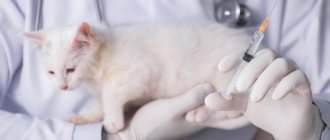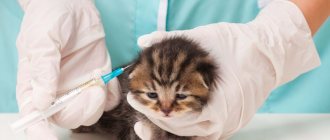What is a rabies vaccination
Rabies is a disease of representatives of the animal world, which occurs in an acute form and is fatal, manifested by damage to the nervous system and hydrophobia.
An infectious disease is transmitted from one animal to another through saliva, blood, eating an infected animal or the bite of a bat. Vaccinating your cat against rabies will completely protect your pet from infection.
The medicine is a weakened virus that is injected into cats for the subsequent production of antibodies, or ready-made antigens. The inactivated vaccine prepares the animal's body to fight rabies.
Types of vaccines
There are different types of rabies vaccine. The medicine must be selected taking into account the age and breed of the animal. It is better to consult a veterinarian on this issue.
Types of drugs for animal immunization:
- “Live” - they contain living virus cells that help form immunity.
- “Non-living” - they contain dead virus cells. Immunity is developed almost instantly, the effect of such cells quickly wears off.
Existing vaccines that are commonly used:
- "Defensor-3" is a complex vaccine for developing immunity in cattle, cats, and dogs. Country of origin: USA. The price of one ampoule is 120–150 rubles. Storage temperature of the drug is from +2 to +7 °C.
- “Nobivac rabies” or nobivac rabies is one of the latest developments by French scientists. Used to prevent the development of panleukopenia and rhinotracheitis infections. The drug can only be used for cats over five months of age.
- The domestic vaccine is called “Rabikan”. It is done free of charge at state veterinary stations. There are no particular complaints about the drug, but according to some owners, the vaccine has a number of side effects and is poorly tolerated by cats.
How and where to get vaccinated
When administering vaccinations, it is important to follow the clear rules and instructions of the veterinarian. The animal must be prepared in advance. The pet should not be debilitated by illness. Contraindications for rabies vaccination in cats:
- increased body temperature;
- diseases that undermine the pet’s immunity;
- loss or change of teeth;
- chronic diseases.
Attention! Vaccination against rabies should not overlap with other vaccinations.
When administering the serum, an intramuscular injection is made in the thigh area. Sometimes the vaccine is placed subcutaneously in the area of the shoulder blade. This depends on the type of drug administered.
Why is quarantine necessary after vaccination against rabies in cats?
This question may arise for anyone familiar with modern rabies vaccines. The fact is that they are made not from living, but from dead cultures of the pathogen.
Simply put, these vaccines cannot cause rabies under any circumstances. Therefore, quarantine seems to be unnecessary (in the classical sense of the term).
What is quarantine and why is it needed?
So, what is quarantine and why is it needed? Quarantine itself is the time for which an animal is isolated from the environment, other animals and people. So what is it even needed for? It's simple:
- Quarantine is required not to protect other animals and people, but to protect the cat. The problem is that immunity from rabies does not develop immediately after vaccination. This takes some time. You need to clearly understand that during this period a cat bitten by a sick animal is highly likely to get sick. Therefore, during this period (from the moment of vaccination to the formation of immunity), the pet must be strictly isolated from contact with the environment and other cats.
- Finally, there is a certain probability (minuscule, but still) that the vaccinated cat is already sick. In this case, the quarantine is “true”, i.e. helps prevent infection of others. But let us repeat - the likelihood of such a scenario in practice is negligible, since any sane breeder, seeing a cat that has been bitten and shows signs of a fight, will in any case show it to the veterinarian.
What happens if you don’t comply with the quarantine deadlines?
Many inexperienced breeders are interested in one question: “What will happen if you do not comply with the quarantine terms?” We will try to answer it in as much detail as possible. I would immediately like to warn cat owners that failure to comply with vaccination and quarantine deadlines is far from the best solution. In this case, the owner puts at risk not only himself, but also all people who in one way or another come into contact with this animal.
So here are the possible options:
- Most likely, nothing bad will happen, but only on the condition that the animal does not walk on the street and is not taken to various exhibitions and similar events.
- It should be taken into account that all information about rabies vaccinations must be recorded in the animal’s veterinary passport. This means that until the end of quarantine the cat will not be able to be taken to the exhibition (more precisely, it will be possible to take it, but it will not be allowed to participate). It will also not be possible to go on vacation with your pet, since they can “wrap” it even within the Russian Federation, not to mention leaving it outside our country.
- The worst option (which you could already guess about) is that the cat is bitten by a sick cat (or a wolf, a bear, etc.), after which he gets sick.
But! As for the last case, everything is not so obvious.
The fact is that immunity in a normal, healthy cat begins to develop within about seven days from the moment of the bite. If everything is in order, then even after direct contact with a sick animal, the pet may not get sick.
In this case, veterinarians resort to “classic” quarantine: they isolate the cat for about ten days and wait to see if it shows signs of rabies. Again, this option is not very good, since there will still be a possibility that the cat has become infected. Thus, the conclusion is simple: you shouldn’t joke with post-vaccination quarantine, since such negligence can have a very bad impact on the future fate of both the cat and its owner.
Development of immunity: nuances
We have already touched upon this issue indirectly a little higher. The fact is that the development of immunity in each animal is a unique process and highly dependent on the characteristics of the body of a particular cat. In some pets it happens faster, in others it happens slower.
This depends on many factors:
- Physical state. The body of a moderately well-fed and absolutely healthy cat will develop immunity three times faster than if compared to a weakened and middle-aged animal (in general, in the latter case, pets should be vaccinated with caution).
- As we already mentioned, age. The younger the pet, the healthier it is, and the faster its defense systems develop immunity (which in this case will be stronger).
- This depends in part on the type of specific rabies vaccine. However, this moment has a greater impact on the maximum duration of immunity, but not on the speed of its formation.
- Quality of nutrition, balanced diet in terms of nutrients, macro- and microelements. The better a cat eats, the faster it will develop high-quality, strong immunity. Accordingly, this is precisely what the standard recommendation of veterinarians is connected with: to feed your pets as best as possible before vaccination.
I would like to emphasize one important circumstance: despite all of the above, the time frame for developing immunity (regardless of the type of vaccine) is approximately the same. For most manufacturers, they are at least three weeks (21 days).
Duration of quarantine
Theoretically, the duration of quarantine should be 21 days, because... It is during this period that stable immunity against rabies is formed. It’s just that at the legislative level (for complete reliability) a period of 30 days is fixed (a month, in other words). Only after this time has passed is the quarantine officially completed.
Important Rules
During quarantine (especially in the first days), you should carefully monitor the cat’s behavior, measure its body temperature once a day, and immediately report any oddities to the veterinarian. We strongly recommend that you do not let your cat outside this month and prevent it from contacting other animals.
Vaccination dates
Many people do not know at what age kittens are vaccinated. It depends on where the baby was purchased. Whether he was born at home, picked up on the street or bought at a pet store.
The first time the vaccination is done according to the generally accepted scheme. Typically, the first vaccination is carried out when the kitten is three months old. Further, the frequency of injections reaches once a year.
Although doctors have differing opinions on how often to give the second shot, a booster vaccination for an adult cat is given eight weeks after the first shot.
The rabies vaccination schedule is determined individually by the veterinarian.
How long does the rabies vaccine last in cats?
The vaccination is valid for one year. After this time, doctors recommend bringing the animal for a second injection, especially if the active virus is being managed.
Rabies vaccination for cat quarantine period
Many owners are interested in the question of what quarantine should be after vaccination against rabies in dogs. Our article will provide a complete answer. In addition, we will tell you how to prepare for vaccination.
Of course, the first place among vaccinations is the rabies vaccination. After all, this disease has no cure. Therefore, its prevention is controlled at the state level.
Why is a rabies vaccination necessary?
As already mentioned, vaccination against this disease is controlled at the state level. Therefore, a dog needs to be vaccinated against rabies (the basic rules of vaccination will be discussed below):
- if she participates in an exhibition;
- crosses the country's border with the owner;
- participates in breeding;
- to keep your pet and family members safe.
Vaccinations may also be required if you want to give the animal for foster care.
Dog vaccination schedule
When to vaccinate? It is very important to know the vaccination schedule for dogs so as not to vaccinate too late or, conversely, too early.
Some veterinarians believe that if vaccination against viral diseases is carried out earlier than three months, then revaccination after twenty-one days is needed to form immunity. And after three months, one injection of the drug is enough.
Revaccination of adults
How often do you get vaccinated against rabies? Immunity is developed 21 days after the dog is vaccinated. During this period, you should not expose the dog to stress or physical activity.
Veterinarians also recommend using gentle vaccination regimens for old, chronically ill animals. For example, some experts advise administering the rabies vaccine to dogs not annually, but once every two years. It is believed that any drug used in practice will support immunity during a given time period.
Preparing for vaccination
Before talking about how long quarantine lasts after vaccination against rabies in dogs, we need to talk about preparation for this event. Deworming is carried out within ten days. Monitor your pet's condition during the week before vaccination.
The day before vaccination, you should take the dog’s temperature in the evening. After all, only healthy animals are allowed to be vaccinated.
Deworming
It is worthwhile to vaccinate dogs according to age, but before any vaccination (except for revaccinations after 21 days), the pet must be dewormed. This must be done approximately two weeks before the intended event.
The choice of drugs is quite extensive. For puppies 3 months old, products are usually used in the form of suspensions.
The following drugs are used in this case:
Dogs older than six months are given tablets (Enwire, Prazitel and others).
Contraindications to rabies vaccination
Contraindications include the following:
- elevated temperature;
- worms;
- immunodeficiency states;
- illness;
- exhaustion;
- individual intolerance.
Some experts advise caution when vaccinating dogs after ten years of age.
How is the vaccination done?
Before vaccination, the doctor examines the dog and measures the temperature. Then he gets vaccinated. The drug is injected into the withers area.
After vaccination, the doctor puts a mark in the veterinary passport. There he indicates the date when the vaccination was given and the name of the drug. Although most often the label from the bottle is pasted on. The veterinarian also signs and seals.
Actions after vaccination. Quarantine
After vaccination, stay with your pet in the veterinary clinic for about twenty minutes. During this time, a severe allergic reaction to the vaccine may occur.
How long does quarantine last after rabies vaccination in dogs? 21 day. During this period, protection against the above-mentioned disease is developed. If your area has a low risk of contracting the virus, then you can go for a walk from the first day after vaccination.
Is an animal contagious after vaccination? No. Since drugs based on killed microorganisms will be taken.
Is it possible to bathe a pet after vaccination? It is better to avoid water treatments for two to three weeks. This is done to prevent complications from hypothermia. Also, after vaccination, it is worth reducing the animal’s physical activity.
Reaction to vaccination - what can it be? When should you urgently go to a veterinary hospital?
Various side effects sometimes occur after vaccination. But don't worry if:
- the dog once refused food;
- the animal's temperature increased to 39.5 C;
- the dog had one-time diarrhea or vomiting;
- The dog is lethargic within 24 hours after vaccination.
A slight lump or swelling may form at the site where the vaccine was administered.
There is no need to worry if the bump on the withers is painless and does not increase in size. This reaction will go away in a week or two.
You should consult a doctor if:
Such a reaction occurs if the vaccine was of poor quality, errors were made during administration, or vaccination occurred during a latent period of some disease.
A little conclusion
https://.ru/article/338099/karantin-posle-privii-ot-beshenstva-u-sobak-grafik-privivok
Indications for vaccination
Important! At the moment, there is no way to treat rabies, since any contact with an animal suspected of being infected is dangerous for medical personnel. In this case, there is only one way out - euthanize the dog.
Owners and breeders should pay special attention to preventive vaccination and must have their dog vaccinated against rabies in a specialized clinic.
A prerequisite is that the pet must be healthy.
According to the current legislation of the Russian Federation, vaccination is mandatory if you plan to:
Vaccination is an effective way to protect not only your own pet, but also all family members from unpleasant situations and the danger of contracting the virus.
Even if the dog constantly sits at home and does not go outside (applies to small ornamental breeds that do not need walking), this does not guarantee 100% protection from the disease.
The infectious agent can enter the house along with outdoor shoes or other objects.
The need for quarantine
It is for these purposes that it is recommended to observe quarantine - the maximum possible isolation in order to give time to recover and develop immunity.
This is explained by the fact that any vaccine involves the introduction of a weakened virus of the corresponding disease, after which the body begins to fight the introduced virus by producing antibodies.
During this period, it is very weakened, so it becomes susceptible to the effects of any external infections: the dog can easily catch any disease, which under normal conditions may not cause any complications, but with a weakened immune system can cause significant harm.
Duration of quarantine
At the same time, for the preparation of accompanying documents necessary for movement across the territory of Russia, the following quarantine periods have been established:
- 30 days – if the animal has not been vaccinated within a year;
- 14 days – if the animal has previously undergone annual vaccination.
Quarantine measures
The main factors that should be avoided during the quarantine period are various kinds of stressful situations and stress on the body, therefore for this period it is recommended:
Note: for adults in areas with a low risk of infection, walking is allowed without restrictions if a leash is used.
- Limit water treatments to prevent hypothermia and the development of possible complications.
- Reduce physical activity.
- Do not change your diet.
The above measures should be observed throughout the quarantine period, after which you can return to your normal lifestyle, resume walks, workouts, etc.
Possible consequences of vaccination
After preventive vaccination against rabies, it is important to carefully monitor the behavior and general condition of the dog, especially during the first 2 days. The following symptoms are normal:
The conditions listed above usually disappear within 2-3 days without any outside interventions.
The occurrence of acute reactions to vaccination should be taken into account during subsequent preventive vaccination sessions and other injectable drugs should be used for these purposes.
It is important to know that after receiving the first vaccination, regardless of whether it is a puppy or an adult dog, you should, in addition to maintaining quarantine, worry about revaccination.
You can also contact our site's staff veterinarian, who will respond to them as soon as possible in the comment box below.
https://usatiki.ru/karantin-posle-privii-ot-beshenstva-u-sobak/ No comments yet!
Source: https://slovovracha.ru/vse-o-privivkah/privivka-ot-beshenstva-koshke-srok-karantina.html
Preparing for vaccination
Preparing cats for vaccination is a very important point. Owners need to properly prepare the animal for vaccination:
- comb your pet for fleas if he has them;
- avoid taking medications;
- Give the animal only healthy food.
Before the procedure, the doctor must examine the animal for ear mites, diseases, and fever. And only after that should the vaccine be prescribed.
Vaccination of cats – is it so important?
The majority of cat owners keep their pets exclusively at home, avoiding contact with other animals, as well as walking outside or going to the country, and therefore believe that their animal will not be able to pick up infectious diseases anywhere. Accordingly, there is no urgent need to vaccinate your cats. But this is a misconception. If you really care about the health of your pet, then vaccinating your cat will help avoid many diseases. No matter how you protect your animal from leaving the apartment, you can bring harmful microbes and viruses into your home on your own shoes. Along with sand and soil, you bring numerous viruses from the street, among them there may be feline infectious diseases that you pick up by walking along the same road where a sick stray animal had previously passed.
When to start vaccination: kitten or adult cat?
If you have good hygiene at home, there is no urgency to vaccinate your kittens. Vaccinations for small animals can begin after two months of age, however, it is better not to carry them out during the period when the animal’s teeth change (4-6 months). So with the first injection you can wait until the baby teeth change. Well, of course, if you are planning to travel out of town with your little kitten or move to another city or abroad, or just want to take your kitten to an exhibition, then you can vaccinate the animal much earlier, starting from two months. The first vaccination is carried out in two stages: the main vaccination and reinforcement (re-vaccination) after 2 - 3 weeks. Subsequently, vaccination is done once a year, preferably always in the same month.
Preparing the animal for vaccination.
In order for the preventive injection to truly become a protection for the small organism, and not harm it, 10 days before the proposed vaccination, it is necessary to carry out deworming (give the cat a dewormer) and treatment against fleas and ticks. It is also not recommended to administer the vaccine to a sick animal or a pregnant cat: the primary vaccination can be postponed, but with a repeat vaccination it is better not to postpone it for more than a month - the likelihood of immunity will be greater. After the procedure, you should visit the veterinarian again so that a specialist can monitor the cat’s condition after vaccination.
After vaccination, the kitten must observe a certain quarantine for 10 - 14 days. During this period, the animal should not be bathed, exposed to drafts, and it is better not to come into contact with other animals. In our clinic, we vaccinate cats with good, mostly imported vaccines, which, as a rule, are well tolerated by animals. However, the kitten has the right to be more lethargic and eat a little worse for two to three days after the injection. If you see these symptoms, you can always call us and consult with a doctor on what to do in this situation.
www.vodoleyvet.ru











